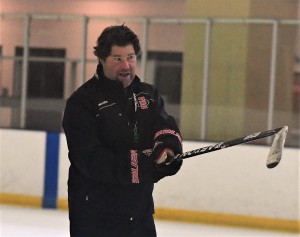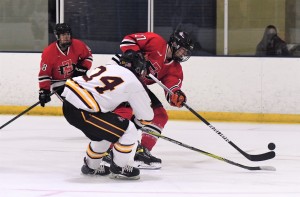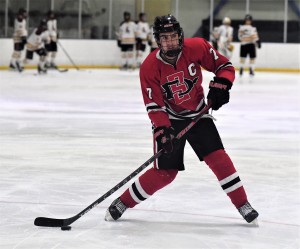SDSU Aztecs advance to top tier of ACHA, make move to Division 1 for 2022-23 season

The San Diego State University men’s ice hockey program received an early Christmas present when the American Collegiate Hockey Association (ACHA) announced on Nov. 22 that it had accepted the Aztecs’ application for membership in the collegiate club organization’s Men’s Division 1 top tier.
SDSU head coach Phil Bateman said he was prepared to file the application for Division 1 membership last November but that was delayed by the COVID-19 pandemic.
Now it’s official.
“I think everyone realizes how important this is to the program, and that it’s been a building process that everyone, from the current players to alumni, have been involved in, and take a lot of pride in,” Bateman said. “Everyone recognizes that.”
It’s a move Bateman has been eyeing since taking over the SDSU program six years ago. He and longtime assistant coach Clark Oliver have helped transform the Aztecs, who are currently competing at the ACHA Men’s Division 2 level, into a championship contender since joining the Pacific-8 Conference (PAC-8) in 2019-20.
SDSU logged its first 20-win season to cap its inaugural season in the conference. The Aztecs are currently 9-3 overall, 5-3 in conference play, as they return to play in the new calendar year ranked sixth among ACHA M2 teams in the West Region.
New horizons
The Aztecs are one of four new ACHA Men’s Division 1 members, joining PAC-8 rival University of Oregon, The College of New Jersey (Ewing, N.J.) and Purdue University Northwest (Hammond, Ind.). All four teams currently compete at the M2 level.
Purdue University Northwest will join the ACHA M1’s Great Lakes Collegiate Hockey League (GLCHL) while The College of New Jersey will join the Northeast Collegiate Hockey League (NECHL). Both SDSU and Oregon will start play as independents in 2022-23.
For Bateman, the team’s acceptance into the M1 fold has opened up a completely new horizon for not only the Aztecs but for California as a whole. SDSU will be the Golden State’s lone ACHA M1 team when the 2022-23 season faces off in September.
 “One of the reasons I did this was for California – that kids in the state didn’t have to go elsewhere to play high-caliber hockey,” the SDSU coach said. “The ACHA is very excited about this opportunity on the West Coast. I’m happy for the kids throughout California.”
“One of the reasons I did this was for California – that kids in the state didn’t have to go elsewhere to play high-caliber hockey,” the SDSU coach said. “The ACHA is very excited about this opportunity on the West Coast. I’m happy for the kids throughout California.”
The Aztecs have already started to tap into the sizable talent pool in Orange County and the greater Los Angeles region. They look to make it a gold rush now. The move up to M1 dangles a carrot in front of potential recruits, providing exposure for NCAA opportunities and even potential professional careers.
Bateman said when he told the current group of Aztecs the news the whole team cheered.
“It’s an unknown with new players but everyone is proud of the program to see where it has come,” Bateman said. “This year the narrative is that we’re a very good team and we’ll see where that goes, and next year is a new narrative because it’s an unknown with new players.
“The guys were accepting. They realize what it means in they’ll be the only M1 team in California.”
Nationwide
The ACHA’s M1 membership for the upcoming 2022-23 season now stands at 72 teams in 24 states. There are 186 schools currently fielding teams at the M2 level.
“We’re thrilled to accept these four institutions into Men’s Division 1 to start next season,” ACHA executive director Craig Barnett said. “We’re really excited to bring in two programs in Purdue University Northwest and The College of New Jersey to solidify our Men’s Division 1 footprint in the Northeast and Midwest. We’re also continuing our mission to grow the game of hockey across America, but especially in the West, by admitting two great schools in San Diego State University and the University of Oregon to the ranks of Men’s Division 1.”
Oregon (11-1) is ranked fifth in the latest release of this season’s ACHA M2 West Region rankings, updated Dec. 28.
The move to M1 status obviously affects the player roster, which will require an upgrade in order to compete at a higher level. Hand in hand with the recruiting process, the advancement to M1 will expose the SDSU program to new sponsorship opportunities and a larger fan base.
 Fortunately, Bateman had the foresight to recruit upward this season with an eye on moving up. This season’s roster features nine AAA recruits compared to just one on the 2019-20 record-setting 20-win team.
Fortunately, Bateman had the foresight to recruit upward this season with an eye on moving up. This season’s roster features nine AAA recruits compared to just one on the 2019-20 record-setting 20-win team.
“When I started the recruiting process in the fall of 2020, the anticipation for me was that we would be ACHA M1 in the fall of 2021, so I aimed for a higher level of player to represent the Aztecs,” Bateman said. “That said, this season we added four varsity players from Minnesota, a couple of top AAA players out of the Chicago area, one AAA player out of the New Jersey area, and several top-end players from California.”
Unfortunately, not everyone on this season’s M2 team will be guaranteed a roster spot on next season’s M1 team. Thus, competition for roster spots should be fierce at next season’s training camp.
“It’s a complete reset,” Bateman said. “I assume most of the guys will want to stay but I’ve got to keep a 25-man roster.”
The result should create a deeper team talent-wise. “What we’re lacking right now is a fourth line, that will change,” the SDSU bench boss predicted.
Puck drop
The Aztecs’ schedule for next season is already starting to take shape even before this season is completed. SDSU has already been invited to participate in the Meltdown Hockey Tournament Oct. 28-30 at Canisius College in Buffalo, N.Y. that will include an outdoor game against Robert Morris University.
The Aztecs will play three games at the upstate New York venue, including their opening game against host Canisius College. Next up is the outdoor game against Robert Morris at the Buffalo River Works. The third game will come against either Temple University, University of Buffalo, Villanova University, Western Michigan or West Chester University to close out the eight-team event.
It’s an opportunity to travel and experience different hockey cultures.
“For the 25 guys who make up the team it will be a life experience, a part of something special,” Bateman said. “There’s going to be a lot of pageantry.”
Bateman is hopeful at some point the Aztecs will be accepted into the Western Collegiate Hockey League (WCHL) which he sees as a natural geographic fit for his team with current league members Grand Canyon University, Arizona State University, University of Arizona, University of Nevada-Las Vegas and the University of Utah in the league’s West Division.
The 10-team WCHL’s East Division includes Colorado State, University of Colorado-Boulder, Missouri State, Oklahoma and Central Oklahoma.
Oregon might also be a geographic fit with the northern portion of the sprawling conference.
“Both of us will be independents for the first year,” Bateman said. “The WCHL is going to look at it and evaluate it after the first season. In 2019 season they brought in the University of Utah, UNLV and Grand Canyon University for the 2020-21 season. They wanted to wait a season and see what happens; there’s an opportunity in the next year.”
 Even though the Aztecs will not be able to compete in league play next season, Bateman said he expects to schedule non-conference games against many of the teams from the WCHL, including the University of Arizona, Arizona State and Grand Canyon University.
Even though the Aztecs will not be able to compete in league play next season, Bateman said he expects to schedule non-conference games against many of the teams from the WCHL, including the University of Arizona, Arizona State and Grand Canyon University.
In the meantime, SDSU already has set up a home-and-home series against the University of Utah, University of Colorado-Boulder and Oregon. The Aztecs will host George Mason University from Virginia and travel to Las Vegas to play a three-game set against UNLV and two other invited Division 1 teams.
“We will look to play at least 20 Division 1 games in our first season in order to qualify for the ACHA M1 rankings,” Bateman said. “The remaining games would come from Division 2 opponents.”
New avenues in recruiting have already opened up since the move to M1 status has been announced, according to the SDSU coach.
“With our advancement up to ACHA Division 1 and being the only ACHA M1 program on the West Coast, many junior programs from the USPHL-Premier, NCDC to NAHL have inquired about sending players to come play for us next season or in the coming years,” Bateman said.
But the current 2021-22 M2 season isn’t quite finished. The Aztecs will play four games in the Big Mountain Classic in Boulder, Colo., from Jan. 14-17, then finish off regular season play with four conference games – two contests each against UC San Diego (Jan. 21-22) and UCLA (Feb. 4-5) – before the PAC-8 holds its conference championship tournament Feb. 11-13 in South Lake Tahoe.
SDSU is looking to conclude some unfinished business before it makes the jump up a level.
“We want to make the most of what’s left in this season,” Bateman said.
Red and Black
Twenty-nine players are listed on this season’s SDSU M2 roster, including 16 newcomers. Thus, it’s not surprising that a newcomer led the team in scoring at the holiday break.
California-born but Massachusetts-reared Cole Kosowski topped the team with 21 points on six goals and 15 assists to lead the current freshman group.
Senior team captain Derian Theberge (Santa Clarita) ranked second with 18 points (10 goals, eight assists), matching Kosowski with three game-winning goals.
Another newcomer, Yorba Linda’s Michael Eng, a Jr. Reign alum, ranked third with 16 points on nine goals and seven assists.
Freshmen Jerrett Overland (two goals, 11 assists) and Marcus Kim (five goals, seven assists) are the Aztecs’ celebrity recruits after leading Santa Margarita Catholic High School from the Anaheim Ducks High School Hockey League (ADHSHL) to two national championship titles.
Overland, fresh off a stint with the Wenatchee Wild in the BCHL, is the team’s top scoring defenseman.
Meanwhile, goaltender Nick Ilvento (South Lake Tahoe) has been the steadying force between the pipes with an 8-3 record, 1.89 goals-against average and .935 save percentage – all standout numbers.
But it hasn’t been all cheerful; team members have had to make personal sacrifices to get to this point while navigating the gross uncertainties of the pandemic.
“It has changed the way I go to school, spend my free time, and has made me very eager to get back on the ice,” said Aliso Viejo native Blake Reed, who racked up 26 goals and 39 points in 29 games during the 2019-20 campaign and is off to a strong start with 10 goals and 13 points in nine games this season. “Online learning is something that I found difficult at first, but thankfully I was able to adapt quickly and have been doing well in my online studies recently. I feel as though there is less accountability necessary in online learning. However, it takes time management skills to be successful.
“I have missed public interactions and large social events as well as being around my teammates and being able to compete on the ice. Obviously, not having a full season for over a year made it difficult to pick up where I left off.”
“COVID-19 had a lot of negative effects on my life, but a few positive ones at the same time,” offered returning forward Ian Stentz, who logged 17 goals and 38 points in 21 games during the 2019-20 season. “The pandemic has just reinforced my belief of not taking anything for granted because anything can change just like that.”
And it has on a very positive note for the Aztecs.
Photos/Phillip Brents
— Phillip Brents
(January 13, 2022)









